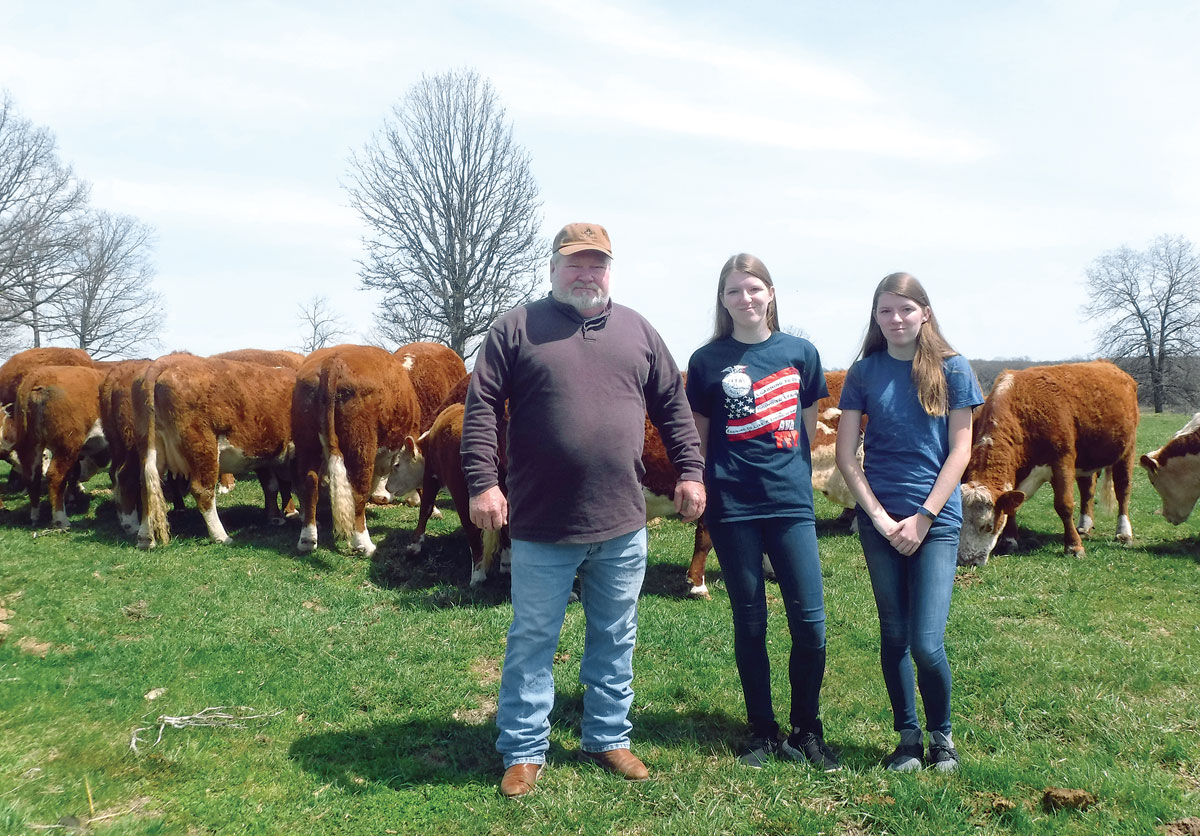
What started as an FFA project for Mark Evans has become a way of life. Mark, pictured with his twin daughters Rebekah and Hannah, is the fifth generation of his family to raise cattle.
For Mark Evans, his cattle operation is a family affair
Cattleman Mark Evans has worked cows since his teens, and knows the value of family when recalling how he started in the cattle business. Mark’s father, Darold, and grandfather, Audie, both farmed.
“I started when I was a freshman in high school, as a FFA project. My dad and I milked together. He retired, we quit milking. My granddad had beef cows, he had Herefords. I think I’m the fifth generation for this area,” Mark recalled with a smile. “I enjoy the cattle. I enjoy being outside when it’s a pretty day.”
“My granddad said all these other breeds were over there when they brought Herefords over here, so I figure they brought the best first.”
Mark continues his grandfather’s legacy as a Hereford producer alive and well with his family’s seedstock operation.
“We keep the best heifers and best bulls for breeding stock to sell off the farm. We take the rest to sell at the sale barn,” Mark said.
Mark opted to continue with Herefords due to their calm disposition.
The Evans family raises their cattle on 200 acres of rolling hills, in Squires, Mo. The land combines several generations of family, as well as acreage from wife Kelly’s family farm, originally used for a dairy operation, as well as beef cattle.
The running of the farm is a family affair, with Mark’s sister and brother-in-law exchanging work for help on their property. Adult children Sarah and Sam also pitch in.
“We have four grandkids and hopefully one day they can help, when they get big enough in the britches,” Mark said with laugh.
Twin daughters, Rebekah and Hannah, ninth-graders at Ava High School, have followed in their father’s footsteps, and are in FFA this year. Rebekah is on the dairy judging team. Both girls have shown their cattle at events in the Ava area. They plan on expanding to larger shows this season.
“It’s a hot, hard job to show,” Mark said. “We have to tie them up and get them broke to lead.”
Both girls simply smiled when asked if they enjoy FFA.
Mark has seen a lot of changes in the industry since he began farming.
“There’s way more cross breeding, I think, than there was years ago,” he said.
Mark acknowledged the risks that come with farming in an era that has seen many family farms sold off, partially due to financial difficulties.
The family is willing to do what is necessary in order to maintain the farming lifestyle they love, which means Kelly works off the farm as an ultrasound technician at Cox Health in Springfield, a position she has held for 22 years.
Mark currently has 65 head, though the exact total can vary. A trip to the pasture behind the house revealed a red and white momma cow/calf herd involved in the serious business of grazing. Heifers are bred to calve when they are 2 years old.
Three herd sires are kept in a separate pasture, and waited patiently while Mark retrieved a bag of feed. He enjoys working with the young bulls and judging their potential.
“Right now we’re sold out of bulls to sell,” Mark said.” We’ll have a few more to wean this spring that we’ll sell. I have crossbred with Brahman and Charolais, but right now we have strictly straight Herefords.”
Mark feeds hay and protein tubs to his cattle, along with salt and minerals.
In the summer months, cattle graze fescue pastures. All livestock receives all necessary vaccinations, and antibiotics only when needed. They are not given any added hormones.
Each breeding season, Mark registers all the information about each new calf with the Hereford Association, and uses a computer to help with record keeping.
“I register all this online with a computer. It saves a little money per head,” Mark added. “With a smart phone, I’ve got access to all the information, too.”






